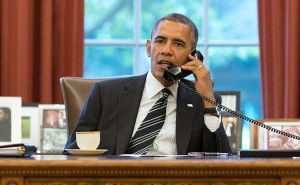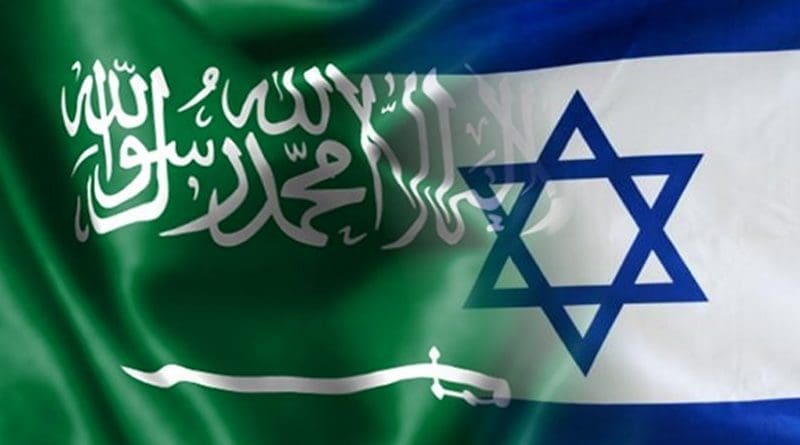The Saudi-Israeli Covert Cold Alliance – Analysis
In one of his press conferences in the 1980s of the last century, the late visionary King Hassan II of Morocco said that the Semitic cousins of the Middle East i.e. Arabs and Jews will resolve their feuds and get together as one family. At the time, pan-Arab nationalists chuckled at the idea and called the Moroccan monarch a mad politician and a traitor of the Arab cause.
Today, Saudi Arabia has unofficially entered into an alliance with its hitherto arch-enemy Israel. For Michael J. Totten, it is a cold alliance:i “The Saudis are congenitally incapable of saying anything friendly about Israel in public—behind closed doors, the Saudis get along with Israel fine…”
However, one wonders, quite rightly, what on earth makes the leader of Sunni Islam accept to seek the friendship of the “Zionist entity”ii kiyan sahyuni and enter secretly with it into some sort of a league. In the Middle Eastern tribal language this practice can be explained by the sacrosanct maxim: “the enemy of my enemy is my friend.”
The enemy in question is no other than Iran that is duly growing itself nuclear teeth, slowly but surely, and posing an existential threat to Israel and Saudi Arabia and the rest of the Sunni world.
Prior to the Iranian Revolution of 1979, Israel was a staunch ally of the Shah’s regime and may have even engaged indirectly in some of the sordid acts of torture of the infamous secret police Savak.
When Khomeini came to power he adopted the Palestinian cause for selfish purposes and called Israel in its official literature and propaganda terminology “little satan.”
Initially, all Palestinians were ecstatic about this political change over, but when the Iranian started making plans to export their revolution to the Sunnis, the PLO pulled slowly out of their love affair with Islamic Iran and the latter threw their support behind Hamas and financed generously its military operations against Israel incurring the cold shoulder and the ire of the Gulf countries.
President Barack Obama kept his electoral promise made to the American people during his first bid to get elected to the White house in 2008 by disengaging American troops from Iraq and allowing Iran through its militias to fill the vacuum.
It was the beginning of a grand design of the Islamic Republic to convert Sunni lands to Shia religion and the last manifestation of that is the open rebellion of the Houthis in Yemen and their control of the country with the help of the militias of the dictator Ali Saleh who fell with the Saudis.

The last straw was the Obama Administration nuclear treaty with theocratic Iran that has, somehow, allowed it to become a major regional player. In the Middle East this realignment of American policy is synonymous of the weakening of the traditional alliance US-Gulf States. In the face of this new reality, the Gulf monarchies had no choice but to seek an alliance with their Semitic cousins of the Jewish state but discretely.
Given that Israel has been playing this “game of discreetness” with the Arab neighbors since 1948, to the extent that it has become an inherent etiquette of its foreign policy, accepted wholeheartedly to stand on the side of the oil-rich sheikhs and defend them.
For Kalman Sporn, Obama has achieved the impossible; he has managed to unite Saudi Arabia with Israel:iii “So after all this Iranian potential nuclear bomb has some positive side effects that is not of the reactive quality but of proactive nature.”
For Leon T. Hadar:iv
After all, if Iran poses an “existential” threat to Israel and to the Arab-Sunnis, perhaps the time has come for them to reach a deal on the Palestinian issue? Or is that again something that the Americans are obligated to deliver to them?
Indeed, an Arab-Israeli peace ceased to be a core U.S. interest. It’s in the interest of the Arab and the Israeli leaders to make peace and work together to secure a stable regional balance of power in face of the challenges posed by an assertive Iran. If they can’t do that, they should pay the price and not expect Washington to get them out of the mess they helped create.
From that perspective, the Iran deal may be the first step in a process that would allow Middle Easterners to finally start writing their own histories instead of expecting Washington to continue running the show for them.
However one wonders what does this cold alliance mean to Israel in the long run and would Israel be willing to pay the price to honor this Confederation of the Semites?
Clearly it will mean accept the Arab Peace Initiative of 2002v for the resolution of the Palestinian predicament with its painful aggregates, mainly the “Right of Return,” the return to the pre-1967 borders and the two-state track. In return, the Sunni Arabs will recognize the existence of Israel and sign a peace treaty with it.
The territorial loss of Israel in this deal will be immediately compensated by an economic bonanza and the demonization of Hamas if they persist to stay a strip of land client of Iran.
Realizing that this alliance is taking shape slowly and surely, Hamas is acting accordingly by siding with Israel as reported by the very serious Jerusalem Post on May 1, 2016 that sported a catchy title “An unlikely trio: Israel, Hamas and Egypt align against ISIS in Sinai”:vi
Israel, Egypt and Hamas have aligned their strategies and formed an unlikely alliance against the Islamic State in Sinai, who are planning increasingly sophisticated and daring attacks in the region, The Washington Post reported on Sunday.
This new alliance is welcomed and championed by the Trump administration that wants to isolate Iran and weaken its resolve to get nuclear. In this policy approach an alliance between Arabs and Israelis could well serve the purpose of Washington in the Area. In this regard John R. Bradley argues in The Spectator:vii
This new geopolitical reality was championed last month by Donald Trump during his visit to Saudi Arabia and Israel. There, he too singled out Iran as the main instigator of terrorism and instability in the region. He gave King Salman (whom he had damned as a promoter of global Wahhabi terror and hatred just months earlier) a huge bear hug. Then he was symbolically flown on Air Force One from Riyadh to Tel Aviv, the first direct flight between Saudi Arabia and Israel. Trump, of course, did not write the speech he had been prepped to read. Truth be told, he would probably not have understood it if he had been in the audience. During the election campaign, he brazenly admitted that he had absolutely no understanding whatsoever of the difference even between (the Shia, Lebanon-based) Hezbollah and the (Sunni, Gaza-based) Hamas. Not since George W. Bush has the White House been inhabited by such an inarticulate, manipulable President with zero foreign policy experience.
Final word
In view of these interesting developments in the Mideast, the late King Hassan II is surely reveling in his grave at this given that he has often called on the Arab peers to marry Arab money with the Israeli genius to develop the area.
Will this happen? Only time can show.
Endnotes:
i. http://www.worldaffairsjournal.org/blog/michael-j-totten/cold-arab-israeli-alliance-against-iran
ii. A common phrasal expression used by Arab countries in their official media to make reference to Israel.
iii. http://observer.com/2015/05/obama-achieves-the-impossible-hes-united-israel-and-saudi-arabia/
iv. http://www.huffingtonpost.com/leon-t-hadar/post-iran-deal-time-for-t_b_7843728.html
v. The Arab League members unanimously endorsed the peace initiative on March 27, 2002. It consists of a comprehensive proposal to end the entire Arab–Israeli conflict. It provides in a relevant part:
(a) Complete withdrawal from the occupied Arab territories, including the Syrian Golan Heights, to the 4 June 1967 line and the territories still occupied in southern Lebanon; (b) Attain a just solution to the problem of Palestinian refugees to be agreed upon in accordance with the UN General Assembly Resolution No 194. (c) Accept the establishment of an independent and sovereign Palestinian state on the Palestinian territories occupied since 4 June 1967 in the West Bank and Gaza Strip with East Jerusalem as its capital.
In return the Arab states will do the following: (a) Consider the Arab–Israeli conflict over, sign a peace agreement with Israel, and achieve peace for all states in the region; (b) Establish normal relations with Israel within the framework of this comprehensive peace.
vi. http://www.jpost.com/Middle-East/An-unlikely-trio-Israel-Hamas-and-Egypt-reportedly-form-alliance-to-fight-ISIS-in-Sinai-452779#xtor=EPR-1-[Newsletter]
vii. https://www.spectator.co.uk/2017/06/unlikely-allies-israel-and-the-saudis/

